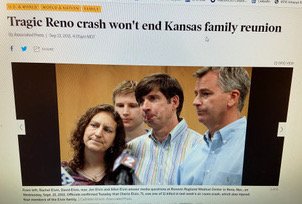
Crisis Communications
Corporate Execs * First Responders
Time is of the essence.
Honesty.
Transparency (to the extent it is legally safe to do so).
I’ll cover the best uses of social media for communicating during a crisis situation.
Why a press release is the worst tactic in a crisis.
When to call a news conference and when you shouldn’t.
I will help you with handling a crisis communications situation by conducting a mock Q & A news conference that will be recorded, reviewed, and repeated so you feel what it’s like to sweat the tough questions. And then improve with repetition.
Optics can be everything…
“You never want a serious crisis to go to waste… It’s an opportunity to do the things you think you could not do before. ”
A Tragedy in My Family That Put Me on the Other Side of the Interview
On September 16, 2011 tragedy struck my family when a modified WWII fighter plane, a P-51D Mustang, abruptly went out of control during a race at the National Championship Air Races at Reno, NV , crashed into the crowd and killed 11 people including my cousin’s wife. My cousin, two of his sons and his daughter-in-law were critically injured, rushed to the hospital, and all four underwent radical surgery to save their lives. All four had their right leg amputated.
Living In the Bay Area and being the closest relative, I jumped in my car and rushed to Reno to gather what information I could for the families who resided in the Kansas City area. The Reno Air Races had become more than a tradition for them. It was a 16 year family reunion to share a love of aviation. Now it had become a nightmare.
Before long, it became clear… the media wanted their story. The family asked me to act as their spokesperson. I felt humbled yet in a strange way, because of my years in journalism, uniquely qualified to help them. For the first time in my career I was on the receiving end of the questions, the camera, and the microphone.
It opened my eyes and ears to how it feels to field the uncomfortable questions. To tactfully answer awkward questions that reporters are going to ask. To politely tell reporters, no more questions. We’re done. And to walk away from the podium with head held high. Dignity intact. I can teach you that. Because I have lived it. Not because I wanted to, but because I had to.
Let me help you do it.



